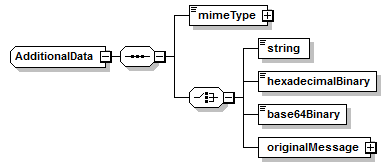
Namespace: |
|
Content: |
complex, 5 elements |
Defined: |
globally in fpml-msg-5-8.xsd; see XML source |
Includes: |
definitions of 5 elements |
Used: |
at 2 locations |

XML Representation Summary |
|||||
<...> |
|||||
|
|||||
</...> |
|||||
|
<xsd:sequence>
<xsd:element name="mimeType" type="MimeType"/>
<xsd:choice>
<xsd:element name="string" type="String"/>
<xsd:complexType>
<xsd:sequence>
<xsd:any processContents="skip"/>
</xsd:sequence>
</xsd:complexType>
</xsd:element>
</xsd:choice>
</xsd:sequence>
</xsd:complexType>
|
Type: |
xsd:base64Binary, predefined, simple content |
Type: |
xsd:hexBinary, predefined, simple content |
Type: |
MimeType, simple content |
|
xsd:normalizedString
|
maxLength: |
255
|
minLength: |
0
|
Type: |
anonymous complexType, complex content |
|
<xsd:complexType>
<xsd:sequence>
<xsd:any processContents="skip"/>
</xsd:sequence>
</xsd:complexType>
</xsd:element>
|
Type: |
String, simple content |
|
xsd:string
|
maxLength: |
255
|
|
XML schema documentation generated with DocFlex/XML 1.9.0 using DocFlex/XML XSDDoc 2.8.0 template set. All content model diagrams generated by Altova XMLSpy via DocFlex/XML XMLSpy Integration.
|